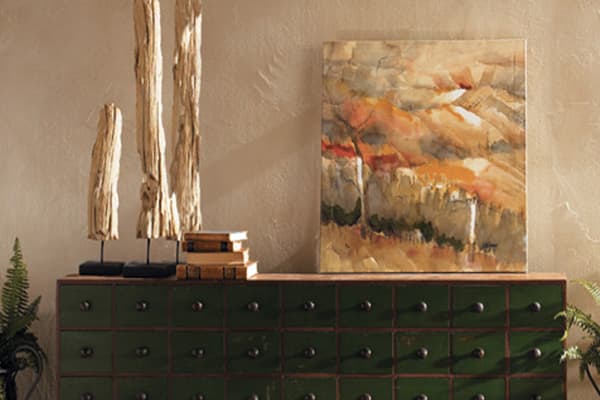How to Install a Receptacle in a Finished Wall
Linda has experience with many home improvement projects. She likes to share her organization, storage and house-cleaning tips.

The wall is smooth fresco earthy texture that exudes a warm rustic appeal.
Sherwin Williams
Wall texture doesn't really get the attention it deserves. Sure, it may not be as sexy and glamorous as architectural elements or furnishings, but it definitely plays an important role in the interior of your home. Texture does more than simply conceal drywall. Interior wall texture serves as a base for paint or wallpaper and creates the first layer of interior design.
It can even evoke a certain mood—like the feeling you get just by gazing at the walls of a time worn Tuscan villa. Isn't it dreamy? So what are you waiting for? It's high time you get acquainted to the most common wall texture techniques. Just be aware that mastering it requires mad DIY skills, the proper equipment, and lots of practice!
Perfect Smooth Coat
If you prefer walls with a classic look rather than a rough texture, consider using a smooth coat finish. Known as skim coats, the smooth finish is ideal for wallpaper applications or to cover over rough surfaces and cracks. It's best to leave this technique to the professionals—even minor mistakes will show up as major defects when the wall is painted or papered. This challenging technique entails applying several mirror smooth layers of joint compound with a hand trowel, allowing each to dry and sand between coats.

You can create a smooth appearance over a rough wall texture.
Vintage Revivals
Popular Orange Peel
The orange peel technique doesn't need much in the way of skill, however, renting the equipment is essential to get it right. This texture gives the appearance of small random bumps on the wall surface. A quick application creates a ordinary interior texture technique.
To achieve the orange peel effect, use a texture sprayer and fill the hopper with a slightly thinned drywall mud. Set the sprayer at a high pressure with a small nozzle. Use a constant movement and overlap the splatter within three feet from the wall. If you are doing a small room or a single wall, try using a thick nap paint roller to create the same orange peel rather than using a hopper spray gun.

The orange peel is a nice smooth dimpled texture.
Modernize
Traditional Knockdown
Knockdown texture carries the orange peel effect one step further. Once the orange peel texture has partially dried, a wide drywall knife is used to lightly skim across the surface to "knockdown" the raised bumps. This results in an attractive pattern that features flat and rough surfaces in a single technique.

Knockdown texture evens out raised peaks to give it a simple flat finish.
Home Tips for Women
Regal Venetian Plaster
The dramatic look of Venetian plaster recreates the patina of timeworn walls of Italian villas. This wall-coating plaster paste produces an ultra smooth surface with intense color. The pigmented compound applied with a knife or trowel requires several coats to achieve its characteristic glossy, marble-like finish. Perfecting the Venetian plaster technique involves a great deal of talent, artistic training, and patience.
Read More From Dengarden

Venetian plaster walls have a subtle sheen and smooth patina that looks like a romantic Italian villa.
Italian Lime Plaster
Retro Slap Brush
Considered a relative of knockdown, the slap brush technique utilizes a drywall brush producing a stipple effect. The application begins with thinned plaster or joint compound applied with a texture hopper or roller. Raised points are created within the wet mud texture by firmly pressing the surface with a drywall or stippling brush. Also known as crow's feet and stomp drag this wall texture technique can easily achieved by a handy homeowner with a little practice.

The slap brush texture is a retro style that is ideal for mid-century home design.
Donald Shaw Drywall
Old World Fresco Finish
For a Spanish or Mediterranean feel, try a trowel finish technique. Troweling an old world finish takes time but the result is worth the effort. Apply generous joint compound and use a drywall knife to make broad, straight strokes, or sweeping half circle motions to create bands of raised texture. This interior wall technique mimics aged plaster or stucco with a simple wash of antiquing glaze.

European fresco texture gives it that old world appearance and feel.
Custom Drywall Service
Skip Trowel
This wall style is close to a knockdown texture, however, there is a slight difference. Try creating this type of pattern to use a trowel to apply the compound directly on the wall by hand. Purchase an 18- to 24-inch curved blade knockdown knife to apply the plaster or mud in thin layers to the drywall. Before applying the compound, make sure you mix the perfect consistency so it doesn't slide down the wall or becomes too thick to spread.

It takes quite a bit of patience to skip trowel practicing by hand.
Texture Master
© 2019 Linda Chechar
Start a Conversation!
Linda Chechar (author) from Arizona on September 28, 2019:
Hey Liz, I had never heard of using backing paper to cover imperfections. That's sure an easier way to create a smooth wall for painting. Thanks for mentioning it!
Liz Westwood from UK on September 27, 2019:
I had no idea that there were so many alternative wall finishes. In the UK, wallpaper was very popular at one time. If people wanted to revert to painted walls after stripping wallpaper, rather than replastering to sort out the blemishes, some hung backing paper, which they then painted over.
How to Install a Receptacle in a Finished Wall
Source: https://dengarden.com/home-improvement/A-Wall-Texture-Primer